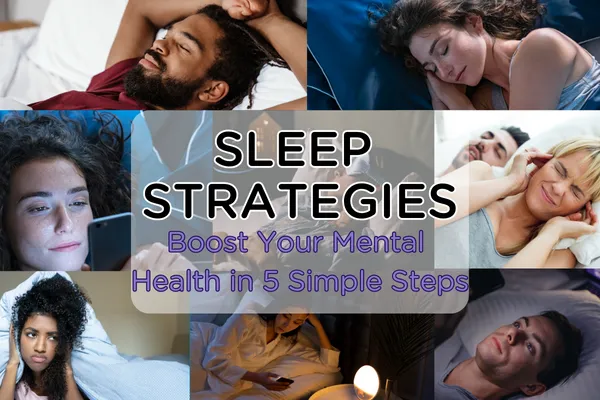General Inquiries: (587) 333-6349 - info@sanostate.com



Sleep Strategies: Boost Your Mental Health in Five Simple Steps
“Getting adequate sleep is crucial for our health! You should take it seriously...” - Kayla Taylor
Twenty-five percent of Canadians are not actually getting enough sleep, and even more (about 33%) are not getting the quality of sleep they need.
Sleep is intricately linked to mental health because it is both a cause and an effect: poor sleep impacts mental health, and poor mental health impacts sleep. You’ve probably heard of sleep stages, including light sleep, deep sleep, and REM (rapid eye movement) sleep. Sufficient amounts of each have a significant impact on both physical regeneration and emotional rejuvenation. A lack of sleep, especially a lack of REM sleep, can be particularly detrimental. This is because the brain doesn’t have a chance to consolidate positive emotional content and engage in proper memory integration. This can lead to mood disorders such as depression and anxiety, difficulties with cognition and memory, and can also impair one’s ability to tolerate stress, causing emotional reactivity. Thus, a significant way to improve mental health is to improve sleep.
How do we improve sleep?
First and foremost: improve your sleep habits. Think of sleep habits like learned skills to encourage better sleep quality and quantity and the associated benefits to physical and mental health.
Here are my top 5 considerations for healthy sleep habits:
Find ways to wind down and relax in the 1-2 hours before bedtime. It seems like a no-brainer, but it is surprising how many people don’t realize that this is a necessity!
We must learn techniques and strategies that help us personally down-regulate and prepare for good sleep. Some people think that they have to wait until they feel tired or simply wait until they drop before they can or will sleep. Always remember, we have more control than we think, and the brain can be trained to engage in self-soothing techniques to help support healthy relaxation and sleep.
Tips to Try:
Think about your sensory and emotional system and what would feel calming and organizing for you, particularly lighting, textures, certain smells, sounds, or tastes. Usually, anything rhythmic will be soothing to our senses, including rocking, swaying, or the sound of ocean waves. Sometimes steady white/brown noise in the background is helpful and can reduce over-thinking or rumination. Steady background noise playing all night can also help us get back to sleep if waking during the night.
Avoid anything too stimulating such as tobacco, caffeine, or rigorous exercise in the evening. Also, avoid substances that interfere with good sleep, such as alcohol or recreational drugs.
Make use of music or apps if desired. Gentle guided or non-guided meditations or sleep stories, soft instrumental music, etc., can be relaxing and increase our slow frequency brain waves in preparation for winding down and sleeping.
Engage in a good amount of physical exertion and/or exercise in the daytime hours to tire your brain and body for the evening hours.
Consistency. Try to sleep and wake at consistent times of night and in the morning. This doesn’t have to be down to the minute, but within about a one-hour span for going to bed. Pay attention to your own unique circadian rhythm; if you always feel tired around 8-9 pm but then push through until 11 pm because you don’t want to go to bed ‘too early,’ you might actually be doing yourself a disservice. Your brain was producing melatonin (a sleep hormone) earlier in the evening, and by pushing through, you’ve now blocked or reduced it. Then it becomes harder to re-establish that production later in the evening hours. This is when we can feel like we ’catch a second wind’ and fall into habits like the going-until-we-drop method (mentioned above) instead of consciously and intentionally engaging in preparation for sleep.
Develop a night-time routine or set of tasks and behaviours that you engage in each night, which will help cue your brain that it is time to get ready to sleep. Remember, our nervous system thrives on predictability. If we can establish a routine that helps our brain predict what is coming next, then it will do wonders in helping us achieve better sleep. Over time and with consistency in your routine, your brain will start to go, “Oh yeah, I know! We do this, this, and then bed.” And begin to function as your friend and not your enemy when it comes to winding down and getting to sleep.
Ensure a high level of comfort in your sleep area. They say that cold, dark, cave-like conditions are best for good-quality sleep. The steady background noise mentioned above can also help in both getting to sleep and staying asleep. This also includes your sleep area, like your bedroom itself. Is it messy and disorganized? Smelly? This can impact your levels of relaxation and your sleep! We’ve all heard the saying that our physical space can affect our mental space, right? The same goes for the bedroom. Make your bedroom your sanctuary and a place that feels calm and safe to go to sleep in. A good place to start without spending lots of money is making sure you have a good pillow!
Use a behavioural strategy if your mind is busy during bedtime. For instance:
Take some time to write down what you are thinking or feeling,
Create a to-do list and tell yourself you can get to it tomorrow,
Use self-talk to redirect. You could say, “This is something to consider tomorrow or at another time; for now, it is time to rest and recoup.”
If you have taken time to improve your sleep habits and are still having trouble, then you could try Neurofeedback therapy, talk therapy, and/or medications to see if treating the mental health side of things helps as well. We have found Neurofeedback therapy to be very impactful on sleep, and it has good supporting evidence for improving regulation and sleep in several research populations. Talk therapy can also be supportive for sleep difficulties and/or mental health concerns. And, of course, medication may also be discussed with your doctor as well.
Getting adequate sleep is crucial for our health! You should take it seriously, as seriously as how you look, eating well, exercising, visiting with friends, or any other thing that you prioritize in your life. I invite you to think about how you sleep and how you could improve some habits. Do this for at least a month so that you can experience the abundant benefits that follow.
If you have questions or concerns about sleep or mental health, please get in touch with us HERE or call us at 587-333-6349. 💙
References
Benatti, B., Girone, N., Conti, D., Celebre, L., Macellaro, M., Molteni, L., Vismara, M., Bosi, M., Colombo, A., & Dell’Osso, B. (2023). Intensive Neurofeedback Protocol: An Alpha Training to Improve Sleep Quality and Stress Modulation in Health Care Professionals During the Covid-19 Pandemic. A Pilot Study. Clinical Neuropsychiatry. http://medicom-mtd.com/htm/Pub/pub_bfb_51.pdf
Kosari, Z., Dadashi, M., Maghbouli, M., & Mostafavi, H. (2019). Comparing the effectiveness of neurofeedback and transcranial direct current stimulation on sleep quality of patients with migraine. Basic and clinical neuroscience. https://www.ncbi.nlm.nih.gov/pmc/articles/PMC7253802/https://www.sleepfoundation.org/mental
Shokrgozar, A., Nekoonam, Y., & Nikkhah, F. (2021, June). The effectiveness of neurofeedback on sleep quality and anxiety in people with coronary artery disease. Neuropsychology. https://clpsy.journals.pnu.ac.ir/?lang=en
Suni, E., & Dimitriu, A. (2023, November 16). Mental health and sleep. Sleep Foundation. https://www.sleepfoundation.org/mental-health
Wang, C., Thompson, W., Chaput, J.-P., Roberts, K. C., & Colley, R. C. (2022, March 16). Sleep behaviours among Canadian adults: Findings from the 2020 Canadian Community Health Survey healthy living rapid response module. Statistics Canada. https://www150.statcan.gc.ca/n1/pub/82-003-x/2022003/article/00001-eng.htm
Disclaimer
Our content is for informational and educational purposes and is not a replacement for professional advice, diagnosis, or treatment. If you're facing mental health concerns, please seek help from a qualified professional for personalized guidance. Every individual's situation is unique, so use the information here at your discretion. While we strive for accuracy, the field of psychology is ever-evolving, and our content may not always reflect the latest research. Please prioritize your privacy by avoiding sharing personal information in comments or interactions. Your well-being is our top concern, so use our content for educational purposes, but remember to rely on professionals for your specific needs.
General Inquiries:
Our Locations:
Additional Resources:
About Us:
We strive for excellence in psychological treatment. We are committed to providing professional, caring, innovative, and research-based services.
© 2024 Sano State Taylored Psychology. All Rights Reserved.

